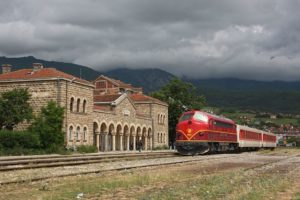A 24-year-old student from Peja, Dardan Dervishaj, says that he traveled every weekend by train from his hometown to Prishtina and back. He says that traveling by train was comfortable, the price was not high, and the timetables were convenient.
“Traveling by train may take a bit more time than traveling by bus, but at the same time, it is safer and more comfortable. Also, the ticket price was reasonable, specifically for the students, since a one-way ticket cost 1.5 euro, different from bus tickets which cost 4 euro,” Dervishaj explains.
Just like Dervishaj, a large number of students who travel on this line preferred traveling by train, but…
Since the beginning of August 2017, passenger trains function only on the line from Prishtina-Skopje-Prishtina. The money for this line has been provided by the Ministry of Economic Development (MED). But the functioning of 10 trains on two lines (Fushë Kosovë-Hani i Elezit- Fushë Kosovë and Prishtinë-Pejë-Prishtinë) has stopped.
This happened because the Government of the Republic of Kosovo did not provide funds.
According to the head of the Media and Public Relations office, Afrim Kuleta from the “Trainkos” company, the money that had been set aside for passenger transport had been spent by June 2017. He explained that up until August, they operated by their (internal) budget.
Out of 1,031,000 € divided by the budget of the Republic of Kosovo, “Trainkos” company has covered its expense for the past year and a sum of around 925,000 €, was spent on running trains until mid-June.
Kuleta says that these two lines will not be available for the passengers until the money is provided by the Ministry of Infrastructure.
“Stopping these lines caused the risk of leaving 700 employees of the company without salaries starting from September,” said Afrim Kuleta from Trainkos.
Stopping railway transport is a concern, especially for the students from Peja region who, due to lack of this transportation, will have to buy a bus ticket home, which is almost three times more expensive than the train ticket.
Fidan Gashi, a 23-year-old student from Peja, often used to travel by train since, as he says, the price of the ticket was reasonable. According to him, the other reason was that the train used to stop almost at the center of Prishtina, whereas busses stop at the outskirts of the city.
“Now I will have to travel by bus, maybe even by car. The expenses will be higher, and for the citizens who do not have good economic conditions is more difficult to afford,” Gashi says.
Since September 2011, by the European Commission`s request, the railways of Kosovo have been divided into two railway sections “Infrakos” (goods transport) and “Trainkos” railway transport operations (passengers transport) in order to liberalize the market in railway transport,
According to the law for the Railways of Kosovo, “Trainkos” is obliged to provide revenues by the tickets sold to passengers. A part of the revenues should be provided by “Infrakos” services, but also by the government or any public authority as a financial compensation for offering transport services for the general interest, or any other revenue or contribution from the public or private sector.
Afrim Kuleta explains that the expenses have been partly covered by the budget of Kosovo from 2011 until now, and the remaining part has been covered by their own resources, which have been partly provided by “Infrakos.”
“We have had higher revenues in the transport of goods. But, the construction of highways forced businesses which transport goods to do transportation through the port of Durrës, and not from the port of Selanik, as they did earlier. This caused the decrease in the revenues from the goods transport, thus making it impossible to provide finance for the passengers’ transport (Trainkos),” Kuleta explained.
“Trainkos” made some calculations based on the amount of the deficit, and discovered that 1,040,000€ should be covered by the Kosovo Budget. Otherwise, the two lines which now have been stopped for passenger transport will be impossible to function.
The Law for the Railways of Kosovo sets the lifetime of the contract of public service from 3 up to 15 years, depending on the time of the amortization of the moving vehicles provided by the railway company. But, Kuleta says, the law has not been respected, because every year they have signed new agreements with the Ministry of Infrastructure, through which it was not possible to exactly foresee how much revenue the company will have and will they be able to cover the eventual deficit.
“There is a commission between “Trainkos” and the Ministry of Infrastructure who evaluate the expense, the bills for the passengers’ transportation. They send the final reports to the ministry and the payment is done through those bills,” he says.
However, he asserted that some requests to cover the expenses until the end of fiscal year that were sent to the Ministry of Infrastructure by “Trainkos” have remained unanswered.
KosovaLive tried to get an answer related to this issue from the Ministry of Infrastructure for days in a row, but no one from the ministry agreed to talk.
The fate of 700 employees from “Trainkos” now depends on the eventual budget revision, which is also laid out in the Law of Kosovo`s Railways.
In the meantime, citizens and students of Kosovo will have to spend a lot more money than they planned for traveling.
Nafie Sylejmani








